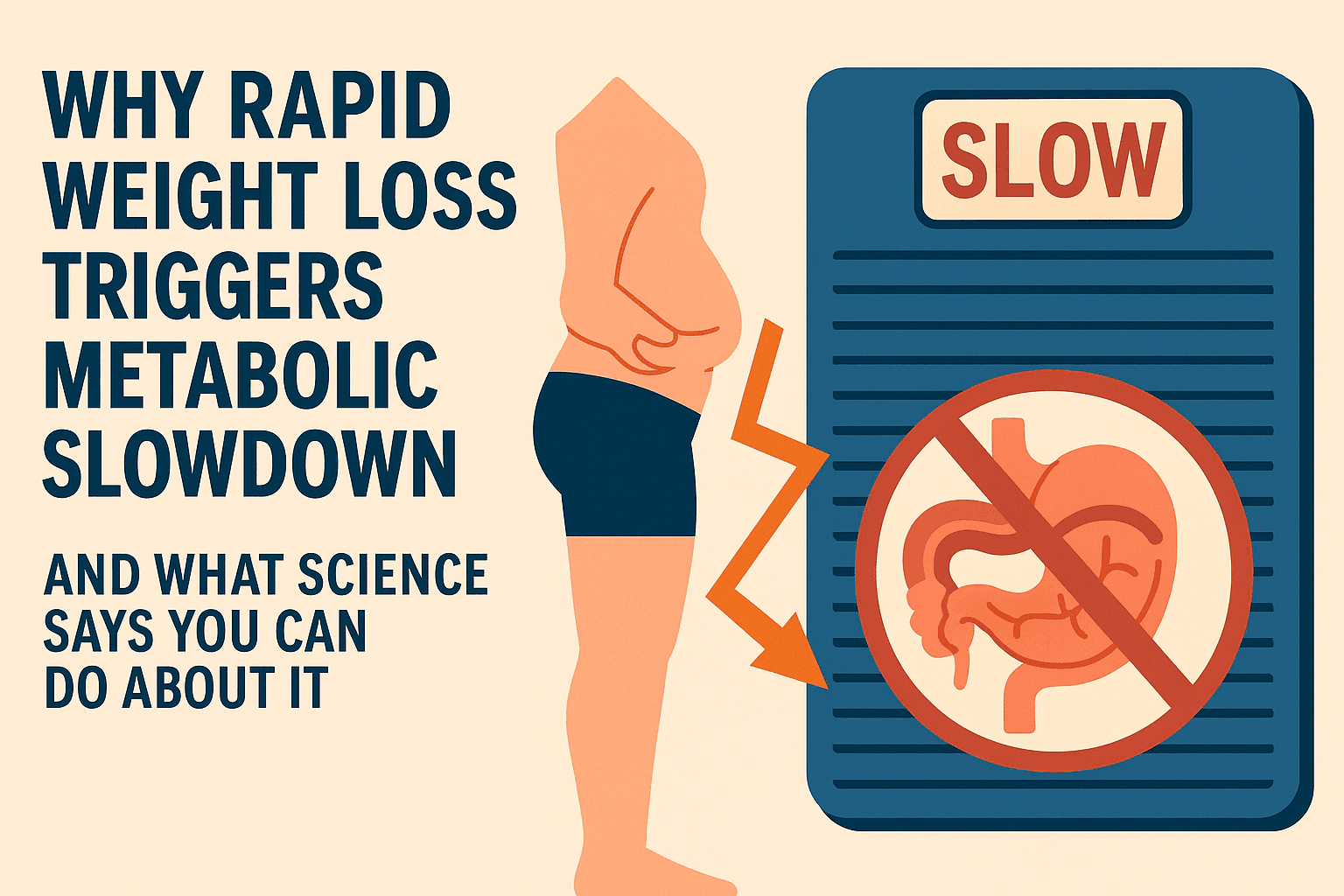Why Rapid Weight Loss Triggers Metabolic Slowdown and What Science Says

Why Rapid Weight Loss Triggers Metabolic Slowdown and What Science Says You Can Do About It
Everyone loves quick results.
That’s why every January, gyms and diets explode with energy — and by March, most people are exhausted, hungry, and wondering why nothing works anymore.
Fast weight loss sounds efficient on paper, but biologically, it’s the opposite.
Your body isn’t lazy.
It’s protective.
And when you push it too hard, too fast, it fights back in ways that can actually make future fat loss harder.
Let’s break down why your metabolism “rebels,” and how to make it your ally again.
1. Your body doesn’t understand your goals — it understands survival
From your body’s perspective, a diet isn’t self-improvement — it’s a famine.
When calories drop dramatically, your brain triggers what scientists call the starvation response.
The thyroid slows down hormone production.
Your resting metabolic rate decreases.
And your body starts holding onto fat while burning through glycogen and muscle tissue.
It’s not personal — it’s evolutionary.
Your body is simply doing what it has done for thousands of years: conserving energy to stay alive.
That’s why extreme deficits lead to that “I’m doing everything right but the scale won’t move” feeling.
Your system isn’t broken.
It’s protecting you.
2. The invisible slowdown called metabolic adaptation
After a few weeks of low calories, the body becomes more efficient at running on less fuel.
This process — known as adaptive thermogenesis — is the reason crash diets stop working.
You unconsciously move less, your body temperature dips slightly, and even digestion slows down.
In research, people who cut calories drastically often burn up to 25% fewer calories per day than predicted.
That means two people eating the same amount can get very different results depending on how fast they lost the weight before.
The fix?
Lose slowly enough that your metabolism can adjust without flipping into defense mode.
3. When the body burns the wrong fuel
If you’re losing more than one to two pounds per week consistently, part of that loss is likely lean tissue.
Muscle isn’t just for looks — it’s a metabolic engine.
Each kilogram of muscle burns dozens of extra calories per day at rest.
So when you diet too fast and muscle breaks down, your daily energy needs shrink.
That’s why crash dieters often end up regaining fat more easily later — they’ve lost the very tissue that keeps metabolism high.
To prevent that, every healthy fat-loss plan must include adequate protein and resistance training.
It’s not optional — it’s metabolic insurance.
4. The hormonal storm that derails motivation
Your hormones are chemical messengers that decide whether you burn or store energy.
During rapid weight loss, they go haywire.
Leptin, the hormone that tells your brain you’re full, plummets.
Ghrelin, the hunger hormone, skyrockets.
And cortisol, the stress hormone, rises — encouraging fat storage around the abdomen.
This trio explains why, after weeks of dieting, you crave sweets, sleep badly, and feel constantly on edge.
Your brain is trying to restore balance, not sabotage you.
Slow, balanced nutrition keeps these signals steady, so your appetite and energy remain under control.
5. Sleep: the metabolic equalizer everyone ignores
Sleep isn’t a passive state.
It’s a nightly reset for hormones that regulate hunger and recovery.
Studies show that people who sleep under six hours a night are 30–35% more likely to regain lost weight within a year.
When you’re sleep-deprived, the body misreads fatigue as hunger, increases ghrelin, and reduces insulin sensitivity.
In short — poor sleep mimics the hormonal chaos of crash dieting.
Want a faster metabolism?
Start with a slower bedtime routine.
Dim the lights, cut screens, and give your body permission to repair itself.
6. Why “slow and steady” works on a cellular level
When you lose weight gradually — around 0.5–1% of body weight per week — the body has time to adjust.
Mitochondria (the energy factories inside your cells) become more efficient, not fewer.
Thyroid hormones stay stable.
And muscle tissue is preserved.
In fact, research published in The Journal of Clinical Endocrinology & Metabolism found that people who dieted moderately maintained better insulin sensitivity and resting metabolic rate than those on crash diets.
Patience isn’t just psychological — it’s physiological.
7. Nutrition isn’t math — it’s communication
Your diet sends messages to your metabolism.
If you constantly swing from restriction to over-eating, your body never learns what “normal” feels like.
That’s why balanced eating — with steady protein, fiber, and complex carbs — helps your hormones relax and your energy stay stable.
Simple routines like eating a nourishing breakfast can signal to your system that food is reliable again.
Over time, these consistent signals rebuild metabolic trust — your body starts burning efficiently instead of storing defensively.
8. The psychology behind metabolic patience
Rapid dieting feels productive because you see progress right away — but it’s rarely sustainable.
Slow progress, on the other hand, builds confidence through repetition.
Every day you eat well, sleep better, and train consistently, you prove to yourself that this isn’t a phase — it’s who you are now.
Consistency beats intensity.
Always.
The mental shift from “fixing my body” to “working with my body” is what separates temporary results from lifelong balance.
9. The practical roadmap to sustainable fat loss
Here’s what science — and experience — show actually works:
Protein first: Aim for 1.6–2.2 g per kg of body weight daily to protect muscle mass.
Mild calorie deficit: Around 300–500 kcal/day below maintenance keeps progress steady.
Resistance training: 3–4 sessions per week maintain lean tissue and metabolic rate.
Sleep hygiene: 7–8 hours nightly for hormonal recovery.
Daily movement: Walk, stretch, and stay lightly active outside the gym.
Hydration: Water supports digestion and energy metabolism more than people realize.
No magic.
No extremes.
Just consistency and recovery working together.
10. The long game always wins
The truth about fat loss isn’t glamorous — but it’s freeing.
You don’t need to destroy yourself in six weeks to transform in six months.
When you nourish instead of punish, your metabolism stops fighting and starts cooperating.
It rewards you with better energy, deeper sleep, improved mood, and long-term stability.
Because in the end, health isn’t built by speed.
It’s built by trust — one balanced day at a time.
Author bio
Luca Fumagalli is a health and fitness writer and founder of GetFitSafely.com , where he explores bodyweight training, yoga, nutrition, and safe, evidence-based ways to build strength and balance. His work blends science, storytelling, and practical insight to help readers train smarter, eat better, and stay injury-free.
Disclaimer:
DocIndia.org does not have any intention to provide specific medical advice, but rather to provide its users and the general public with information to better understand their health. All content (including text, graphics, images, information, etc.) provided herein is for general informational purposes only and is not a substitute for professional medical advice, care, diagnosis, or treatment. DocIndia.org makes no representation and assumes no responsibility/ liability for the accuracy of the information, advice, diagnosis, or treatment provided herein or on its website. NEVER DISREGARD PROFESSIONAL MEDICAL ADVICE OR DELAY IN SEEKING TREATMENT BECAUSE OF SOMETHING YOU HAVE READ HERE OR ACCESSED THROUGH THE DOCINDIA.ORG WEBSITE.
Author

DocIndia Editorial Team
Check cache DocIndia Editorial Team works with Doctors to create informative articles. View More
